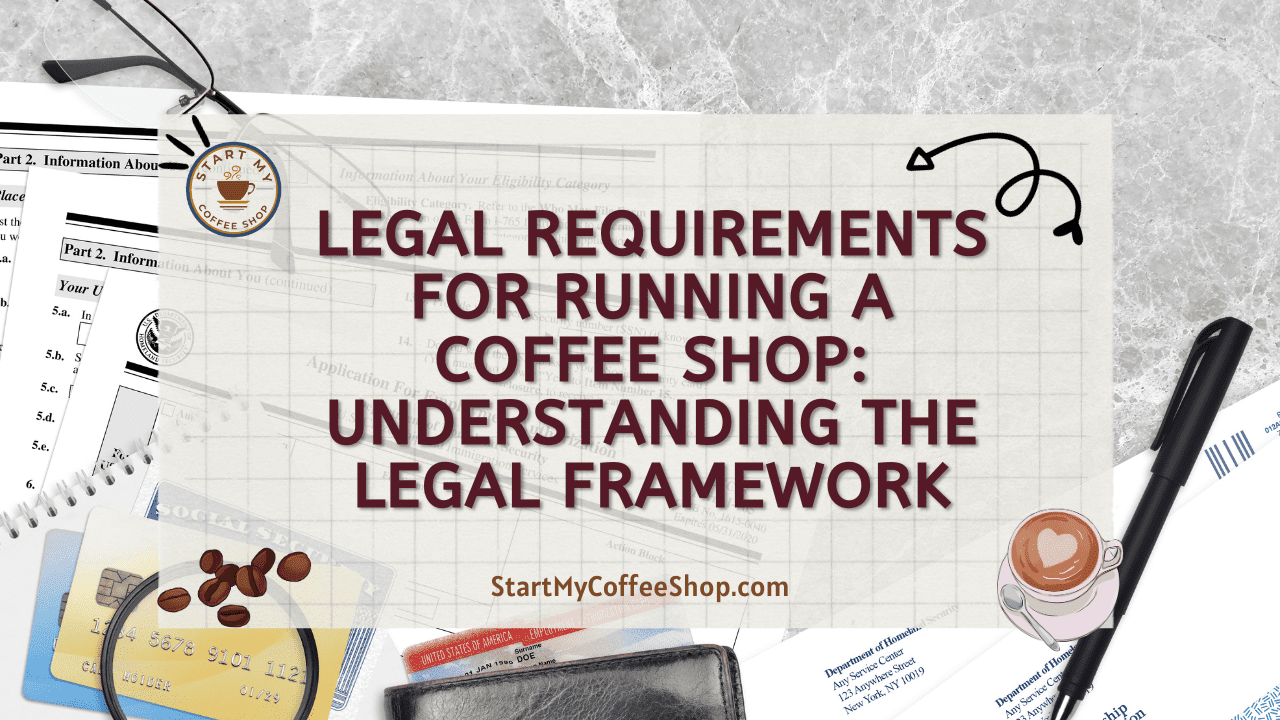It is essential to understand and comply with the legal requirements associated to ensure a safe and compliant operation.
Running a coffee shop requires compliance with various legal requirements like business registration and permits, health and safety regulations, employment laws, and intellectual property protection.
In this article, we will explore the key legal aspects you need to consider when opening and operating a coffee shop. Let’s delve into the essential legal requirements for running a coffee shop.
Business Registration and Permits

Before opening a coffee shop, it is crucial to register your business and obtain the necessary permits. Depending on where you are, the particular requirements could be different, but generally speaking, you must:
Choose a business structure: When starting a business, it’s important to select the right structure: sole proprietorship, partnership, or LLC. Each option carries unique legal and tax considerations. Carefully consider the implications of each business structure: sole proprietorships offer simplicity, while partnerships allow shared responsibilities.
LLCs provide liability protection. Deciding on the appropriate business structure is crucial as it impacts legal obligations and tax responsibilities, so research and seek professional advice when necessary.
Register your business name: Select a distinctive and enticing name, then proceed to officially register it with the relevant governmental entity. Ensure your business name stands out while complying with registration requirements, as this helps establish your brand identity and protects against potential trademark conflicts.
Completing the registration process with the appropriate government agency solidifies your ownership of the chosen name and enhances your coffee shop’s professional image.
Obtain a business license: You must acquire a business license, which can be obtained by applying to your local government or municipality. Securing a valid business license is essential as it ensures your coffee shop operates legally and in compliance with local regulations and requirements.
By obtaining the necessary business license, you gain official authorization to run your coffee shop and demonstrate your commitment to operating within the parameters set by the local authorities.
Foodservice permits: In addition to serving beverages, coffee shops often offer food items, making it necessary to obtain specific licenses. To ensure compliance with food safety regulations and inspections, you may need to secure additional permits such as a food service establishment permit or a health department permit. These permits demonstrate your commitment to maintaining a clean and safe environment for food preparation and service.
Alcohol licensing (if applicable): It is crucial to obtain the required alcohol licensing and adhere to the relevant local liquor regulations. Acquiring the necessary alcohol license ensures that you are legally authorized to serve and sell alcoholic beverages, demonstrating your compliance with the specific laws and regulations governing the sale of alcohol in your area.
Read more about: How Much it Cost to Open Coffee Shop: Estimating the Initial Investment
Health and Safety Regulations
Maintaining a clean and safe environment is crucial for the growth of your coffee shop. Adhering to health and safety regulations not only protects your customers but also safeguards your business from legal liabilities. Consider the following aspects:
Food safety and hygiene: Ensure that all food and beverages served meet the required health and safety standards. This includes proper storage, preparation, handling, and disposal of ingredients. Regular inspections and training for your staff on food safety practices are essential.
Sanitation and cleanliness: Maintaining a clean and hygienic coffee shop is paramount to ensuring the health and satisfaction of your customers. Regularly clean all surfaces, utensils, and equipment to prevent the spread of germs and maintain a pristine environment.
Adhere to industry guidelines for cleaning schedules, which may include daily sanitization and deep cleaning at regular intervals. Implement effective waste management practices, including proper disposal of trash and recycling.
Allergen awareness: Be aware of common food allergens and take appropriate measures to prevent cross-contamination. Clearly label menu items that may contain allergens and provide accurate information to customers about potential allergenic ingredients.
Employee health and safety: Creating a safe working environment for your coffee shop employees is crucial. Adhere to occupational health and safety regulations, conduct regular safety training sessions, and establish protocols for handling emergencies and accidents. Prioritizing employee health and safety not only protects your staff but also fosters a positive and productive workplace culture.
Fire safety: Install and regularly maintain fire extinguishers, smoke detectors, and emergency exit signs. Familiarize your staff with evacuation procedures and ensure compliance with fire safety codes.
Accessibility compliance: Ensure that your coffee shop is accessible to individuals with disabilities, complying with accessibility standards and guidelines. This may include providing wheelchair ramps, accessible restrooms, and appropriate signage.
Employment Laws and Regulations
When hiring employees for your coffee shop, it is essential to comply with employment laws and regulations. Consider the following key aspects:
Hiring and employment contracts: Clearly outline the terms of employment in written contracts, including job descriptions, compensation, working hours, and other relevant policies. Familiarize yourself with local employment laws regarding minimum wage, overtime, and employee benefits.
Workforce eligibility: Verify that your employees are legally eligible to work in your country or region. This may require completing employment eligibility verification forms and ensuring compliance with immigration laws.
Minimum wage and working hours: Familiarize yourself with the minimum wage requirements in your jurisdiction and ensure that your employees are compensated accordingly. Also, adhere to regulations regarding working hours, breaks, and overtime pay.
Anti-discrimination and harassment policies: Establish policies and procedures that promote a workplace free from discrimination and harassment. Train your employees on these policies and promptly address any complaints or incidents that arise.
Employee benefits and leave policies: Comply with laws regarding employee benefits, such as health insurance, retirement plans, and paid time off. Familiarize yourself with family and medical leave requirements to accommodate employees’ needs.
Safety in the workplace: Provide a safe and secure environment for your employees. Implement measures to prevent workplace injuries and accidents, such as proper equipment maintenance, training programs, and safety protocols.
Intellectual Property and Trademarks

When establishing your coffee shop’s brand identity, it’s important to consider intellectual property rights and trademarks. Consider the following steps to protect your brand:
a) Trademark registration: Trademark registration is an important step for your coffee shop’s brand protection. By registering your coffee shop’s name, logo, and distinctive branding elements as trademarks, you can prevent others from using similar marks that may confuse customers.
Trademarks provide legal rights and exclusivity, ensuring that your unique identity remains protected in the market. Consulting with a trademark attorney can guide you through the registration process and help safeguard your coffee shop’s valuable intellectual property.
Copyright protection: Copyright protection is essential for safeguarding your coffee shop’s original content. Whether it’s website designs, menus, or promotional materials, obtaining copyright protection ensures that others cannot use or reproduce your creative work without permission. Copyright grants you exclusive rights to control how your content is used, distributed, and displayed.
Registering your copyright with the appropriate intellectual property office strengthens your legal position and provides evidence of ownership. In case of infringement, copyright protection allows you to enforce your rights and seek legal remedies. It’s advisable to consult with a copyright attorney to understand the best approach for protecting your coffee shop’s valuable creative assets.
Non-disclosure agreements: Non-disclosure agreements (NDAs) are crucial in safeguarding your coffee shop’s valuable secrets. If you have unique recipes, innovative business strategies, or other confidential information that gives your coffee shop a competitive edge, implementing NDAs is highly recommended.
These agreements ensure that anyone with access to sensitive information, such as employees, contractors, or suppliers, is legally bound to maintain confidentiality. NDAs outline the terms and consequences of unauthorized disclosure, providing you with legal recourse if someone breaches the agreement.
By using NDAs, you can trust that your trade secrets remain protected, allowing your coffee shop to maintain its unique position in the market. Consult with a legal professional to draft effective and enforceable NDAs for your business.
Avoiding intellectual property infringement: To avoid intellectual property infringement, it is crucial to conduct comprehensive research before finalizing your coffee shop’s branding elements. This includes checking for existing trademarks and copyrights that may conflict with your chosen name, logo, or other creative assets. It is advisable to consult with a legal professional or utilize specialized intellectual property search tools to ensure your branding is unique and doesn’t infringe upon the rights of others. Taking these proactive measures can save you from potential legal troubles and preserve the integrity of your coffee shop’s identity.
Read more about: How Much it Cost to Open a Coffee Shop: From Concept to Cash
Licenses for Music and Public Performance
If you plan to play music or host live performances in your coffee shop, you will need to obtain licenses to comply with copyright laws. Here are a few important considerations:
Performing Rights Organizations (PROs): PROs manage the rights of songwriters and music publishers. Contact the appropriate PRO in your country, such as ASCAP, BMI, or SESAC in the United States, to obtain a license for the public performance of copyrighted music.
Background music streaming services: If you use streaming services like Spotify or Apple Music for background music in your coffee shop, ensure that you have the appropriate commercial licensing. These services often offer business-specific plans to comply with copyright regulations.
Live performances and events: If you plan to host live performances or events featuring artists, musicians, or DJs, ensure that you secure the necessary licenses or agreements with the performers or their representatives.
Compliance with music licensing regulations: Familiarize yourself with the specific regulations and requirements related to music licensing in your jurisdiction. Maintain proper records and documentation of the licenses obtained to demonstrate compliance during potential inspections.
Summary
Running a coffee shop requires adherence to various legal requirements to ensure an effective and compliant operation. Remember to stay updated on the evolving laws and regulations in your jurisdiction to maintain compliance and improvement in your coffee shop venture.
Frequently Asked Questions

Do I need a specific license to open and operate a coffee shop?
Answer: Yes. You will typically need a business license to legally operate a coffee shop. Depending on your location, you may require specific permits like food service permits or alcohol licensing if you plan to serve alcoholic beverages.
Are there any employment laws that I need to be aware of when hiring employees?
Answer: Yes, when hiring employees, you must comply with employment laws and regulations. This includes providing written contracts, adhering to minimum wage requirements, determining proper working hours, implementing anti-discrimination and harassment policies, and offering employee benefits as per local laws.
How can I protect my coffee shop’s brand and intellectual property?
Answer: Consider trademarking your coffee shop’s name, logo, and unique branding elements. Copyright protection can be sought for original content. Non-disclosure agreements can help protect trade secrets. Conduct thorough research to avoid intellectual property infringement and legal disputes.
To learn more on how to start your own coffee shop, check out my startup documents here.
Disclaimer: The information provided by StartMyCoffeeShop.com (“The Site”) is for general informational purposes only. All information on the Site is provided in good faith. However, we make no representation or warranty of any kind, express or implied, regarding the accuracy, adequacy, validity, reliability, availability, or completeness of any information on the Site. Under no circumstance shall we have any liability to you for any loss or damage of any kind incurred as a result of the use of the Site or Reliance on any information provided on the Site. Your use of the Site and reliance on any information on the Site is solely at your own risk. This blog post is for educational purposes only and does not constitute legal advice. Please consult a legal expert to address your specific needs. Terms and Conditions. (https://startmycoffeeshop.com/terms-and-conditions/)

Hi! I’m Shawn Chun
My adventure in coffee began when I first launched my first coffee shop back in the early 2000s. I had to figure out so many things on my own and to make it worse within 2 years of opening two large corporate coffee chains moved in just blocks away from me!
As I saw smaller and even some larger coffee shops in the neighborhood slowly lose customers to these giant coffee chains and slowly close up shop, I knew that I had to start getting creative…or go out of business.
I (like you may be) knew the coffee industry well. I could make the best latte art around and the foam on my caps was the fluffiest you have ever seen. I even had the best state-of-the-art 2 group digital Nuova Simonelli machine money could buy. But I knew that these things alone would not be enough to lure customers away from the name brand established coffee shops.
Eventually, through lots of trial and error as well as perseverance and creativity I did find a way to not only survive but also thrive in the coffee/espresso industry even while those corporate coffee chains stayed put. During those years I learned to adapt and always faced new challenges. It was not always easy, however, in the end, I was the sole survivor independent coffee shop within a 10-mile radius of my location. Just two corporate coffee chains and I were left after that year. All told the corporate coffee chains took down over 15 small independent coffee shops and kiosks and I was the last one standing and thriving.
Along the years I meet others with the same passion for coffee and I quickly learned that it is not only “how good a barista is” that makes a coffee shop successful, but the business side of coffee as well.
Hence why I started this website you are on now. To provide the tools and resources for up and coming coffee shop owners to gain that vital insight and knowledge on how to start a coffee shop successfully.
Stick around, browse through my helpful blog and resources and enjoy your stay! With lots of LATTE LOVE!
Shawn







